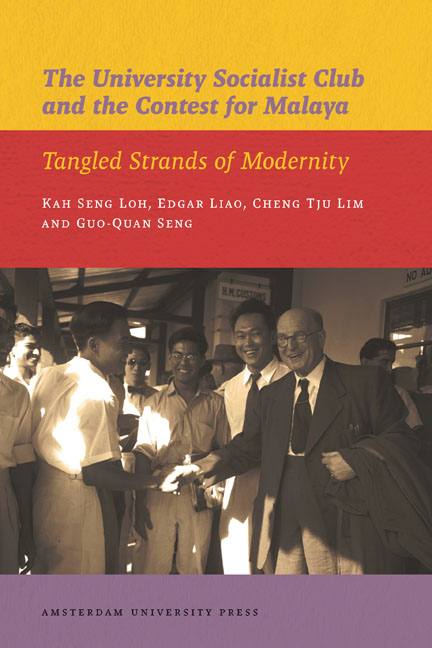Book contents
- Frontmatter
- Dedication
- Contents
- Acknowledgments
- List of Photographs
- Abbreviations
- 1 The Socialist Club and the Modernity Project
- 2 Awake in the Bowl of Night
- 3 The Fajar Trial
- 4 Visionary of the Nation, Voice of Stifled Malayans
- 5 A Beacon of Light on the Campus and Beyond
- 6 Frankly Partisan in the Struggle for Student Leadership
- 7 The Shadow over the Club
- 8 Resisting Malaysia, Swansong for Malaya
- 9 Long Night after Coldstore
- 10 In Defence of University Autonomy and Student Rights
- 11 Entwined Memories and Myths
- Conclusion: Modernity in Singapore and Malaya Reconsidered
- The University Socialists: Biographical Sketches
- Timeline of Events
- Notes
- Bibliography
- Index
- Publications Series
10 - In Defence of University Autonomy and Student Rights
Published online by Cambridge University Press: 21 January 2021
- Frontmatter
- Dedication
- Contents
- Acknowledgments
- List of Photographs
- Abbreviations
- 1 The Socialist Club and the Modernity Project
- 2 Awake in the Bowl of Night
- 3 The Fajar Trial
- 4 Visionary of the Nation, Voice of Stifled Malayans
- 5 A Beacon of Light on the Campus and Beyond
- 6 Frankly Partisan in the Struggle for Student Leadership
- 7 The Shadow over the Club
- 8 Resisting Malaysia, Swansong for Malaya
- 9 Long Night after Coldstore
- 10 In Defence of University Autonomy and Student Rights
- 11 Entwined Memories and Myths
- Conclusion: Modernity in Singapore and Malaya Reconsidered
- The University Socialists: Biographical Sketches
- Timeline of Events
- Notes
- Bibliography
- Index
- Publications Series
Summary
In the 1960s, the Socialist Club frequently found itself engaged in defending the autonomy of the one remaining arena where its voice was still ringing out loud: the campus. The collision between the state and students over the issues of university autonomy, academic freedom and student rights in the 1960s grew out of the tensions over the university's role that had existed since its inception in 1949. Yeo Kim Wah has noted how the very first cohort of student leaders in 1949-1950 “felt it their duty to vigilantly guard” these principles and even occasionally oppose “the sizeable presence of government elements in the university as a possible impingement on university autonomy”. For twenty-five years thereafter, the issues of university autonomy, academic freedom and student rights became a recurring trigger for protest among more student groups. Beyond the University of Singapore campus, the university's students also became deeply concerned about the escalating pressure exerted on their fellow students in other educational institutions in Singapore. The exacerbated urgency and intimacy of the questions of university autonomy, academic freedom and student rights in the mid-1960s coalesced into a passionate student movement in which University of Singapore student activists of all political orientations actively participated.
The Socialist Club usually participated as a follower, rather than as a leader, in student protests against state interference in the university. It did so both directly and through the efforts of its members in the Students’ Council. Many Club members saw the principles of autonomy and rights as inviolate and central to the roles and identities of the university and its students. Foremost among these was the right and obligation of students to contribute to national politics. As a student society of unabashedly critical and committed student activists, the Club often encountered and provoked government attention. The critical questions the University Socialists asked about the economic marginalisation of the masses, the deep-seated problem of communalism, the arbitrary use of undemocratic powers and the persistent forms of neo-colonialism in Singapore were deemed to be distracting, even dangerous, to the reconstitutive work of the post-colonial state. The Club's members also celebrated its survival and resilience in the aftermath of yet another round of political suppression.
- Type
- Chapter
- Information
- The University Socialist Club and the Contest for MalayaTangled Strands of Modernity, pp. 209 - 232Publisher: Amsterdam University PressPrint publication year: 2012

